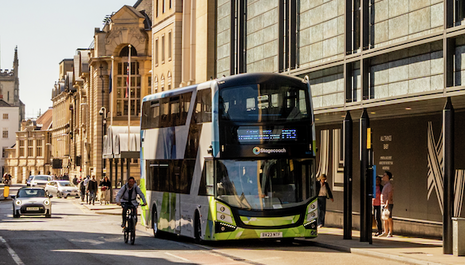Are we really too busy for the bus?
Beth Lee investigates whether city transport truly delivers for students racing against the clock

I used to think I was too busy for the bus. In my first year, I started cycling after losing faith in bus timetables. But now that I am in my final year at Cambridge, I am rethinking transport and rediscovering the practicalities of taking the bus. My conversations with students seem to reveal that others are also rediscovering bus-travel as a viable, even vitalising, alternative to cycling at Cambridge.
The University subsidises the U Bus for students. It is now “the only privately operated and funded fully electric bus service in the UK” switching from diesel to electric in 2023. It offers ‘split service’ toward Girton at one end and Homerton at the other, thanks to a student campaign for an extended route in 2022.
Law student Grace has been taking the bus from Homerton since her first year. Her experience of the Cambridge bus system has been “on the whole fairly good” notwithstanding small delays. She describes the U Bus as “super comfortable and often not too busy”. Her advice is to check Google Maps rather than relying on the board at the bus stop. Third-year engineer Jonny was similarly “very pleased with the Cambridge bus system” after tearing his ACL and spending several weeks on crutches: “they ran very regularly (if not super on-time) and weren’t generally crowded or dirty or anything. The drivers were also very kind; there were a couple of occasions where they waited as I was hobble-running up to the stop.”
Grace describes the U Bus as “super comfortable and often not too busy”
While affordability might be an obstacle to taking the bus, student subsidies are a way to help with financial stresses. The student fare on the U Bus has recently risen from £1 to £1.50, but with a ‘Tiger pass’, residents under 25 can take most buses in the Combined Authority region for £1. Pass-holding students won’t feel the price hike on the U Bus; all it takes is a five-minute online application.
For many, the critical cost is lost time. Cycling is usually more reliable, and faster: Google Maps estimates for a bus ride to the centre are often more than double the same for cycling. Student subsidies are a considerable perk, but they don’t touch the time tax. This year, I am learning some tips and tricks to absorb those added minutes into my schedule.
For me, the bus is a buffer between personal and academic life. This soaks up the bitty tasks that break up concentration in dedicated study spaces. It is easier to compartmentalise life admin by giving it four walls: replying to emails can be a discrete part of your day.
Being unproductive can be just as valuable. Grace finds it “nice to have a bit of time to myself in the morning, especially before a 9am” and uses the journey to listen to music or play the New York Times games. In a 2019 survey by the Urban Transport Group, 45.1% of respondent bus-users in Leeds and Nottingham used their bus-time for “[w]indow gazing/people watching,” and 27.1% spent the time “[u]sing the internet for leisure”. This is an opportunity for rest, an intrinsic good and a stimulant for creativity. The time-tax logic teaches us a false economy; working non-stop is a bus ride to burnout.
“The time-tax logic teaches us a false economy; working non-stop is a bus ride to burnout”
Students are generally not allowed to possess a car in the city. For fringe colleges, this leaves two options: bike vs bus. A rickety bicycle emblematises our student experience: Cambridge is a cyclist’s city, with just over 50% of residents aged 16-25 cycling at least once a week in 2023.
Grace broke with the trend and started taking the bus in first year, but thinks that her aversion to cycling may have something to do with her quality of bike: “my bike […] has been described by friends as a ‘torture machine’ - it has really worn out tires and little to no suspension so maybe I would feel differently with a higher quality bike.”
Taking the bus also sounds like a lifestyle choice: she “hate[s] cycling and arriving to lectures feeling sweaty”. But with so many cyclists around, this must be a minority opinion. From a cyclist’s perspective, I interviewed another third-year Homerton student studying law, with lectures in the city centre. And – just to make sure it’s a fair test – she even has the same name. This is Grace P, a cyclist who even lived next-door to ‘the other Grace’ in first year.
She chooses her bike over the bus because “often I don’t have a lot of time in between my lectures and my supos[…] I coach rowing so if I’m getting from the boathouse to lectures, you couldn’t do it by getting the bus.” Cycling is “quite a quick mode of transport and very reliable obviously […] unless it breaks, but most of the time it’s reliable”.
But even all the unchained freedom of cyclists has its limits: Grace P has been delayed a few times by a frozen bike lock in winter. Cycling in all seasons takes a special kind of grit, but “in the summer it’s pretty smooth sailing”. Her overall verdict: cycling is “a bit of a faff,” but she would enjoy it more if she didn’t do it so much. When she’s coaching rowing, Grace spends about two hours on her bike in a day: “I don’t hate it, but I don’t like it either”.

Cambridge caught on camera – should we leave our phones behind?
Despite the remarkable number of constant variables, comparing the two Graces yields no iron-clad conclusion. There is probably no objective answer to the bus vs bike question: they are “just two different options,” says Grace P. All depends on the individual; if not name, then disposition and personal preference.
The numbers can deter, but the benefits of busing are harder to quantify. I have saved in sweat, and get to lectures feeling fresher. I wear fewer layers; I spend less time complaining about the cold. I have fewer fly-aways and helmet hair is history. These soft statistics don’t figure in my annual budget, but I feel like a new woman.
Cambridge students like to be in control. Taking the bus disempowers the planners and perfectionists, the clock-watchers counting the minutes. It is an act of faith which subordinates your schedule to forces beyond your control. But my own leap of faith has been well-rewarded; a slower start conduces to calm and a good hair day.
 News / Judge Business School advisor resigns over Epstein and Andrew links18 February 2026
News / Judge Business School advisor resigns over Epstein and Andrew links18 February 2026 News / Hundreds of Cambridge academics demand vote on fate of vet course20 February 2026
News / Hundreds of Cambridge academics demand vote on fate of vet course20 February 2026 News / Petition demands University reverse decision on vegan menu20 February 2026
News / Petition demands University reverse decision on vegan menu20 February 2026 News / CUCA members attend Reform rally in London20 February 2026
News / CUCA members attend Reform rally in London20 February 2026 News / Gov grants £36m to Cambridge supercomputer17 February 2026
News / Gov grants £36m to Cambridge supercomputer17 February 2026









